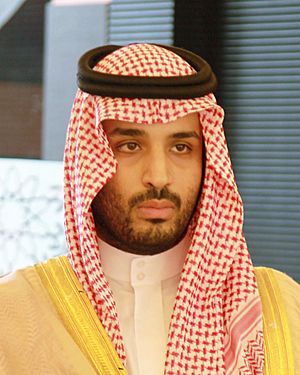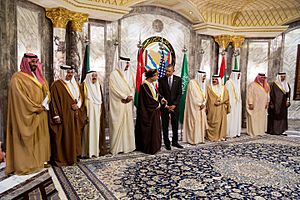Mohammed bin Salman facts for kids
Quick facts for kids Mohammad bin Salmanمحمد بن سلمان |
|||||
|---|---|---|---|---|---|
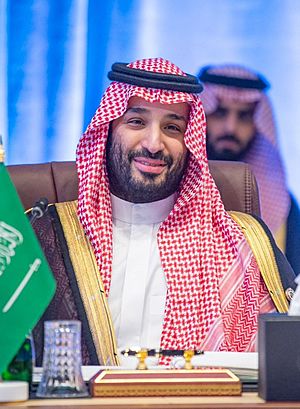
Mohammed in 2023
|
|||||
| Crown Prince of Saudi Arabia | |||||
| Tenure | 21 June 2017 – present | ||||
| Predecessor | Muhammad bin Nayef | ||||
| Monarch | Salman bin Abdulaziz | ||||
| Prime Minister of Saudi Arabia | |||||
| Tenure | 27 September 2022 – present | ||||
| Predecessor | Salman bin Abdulaziz | ||||
| Monarch | Salman bin Abdulaziz | ||||
| First Deputy Prime Minister of Saudi Arabia | |||||
| Tenure | 21 June 2017 – 27 September 2022 | ||||
| Predecessor | Muhammad bin Nayef | ||||
| Successor | Vacant | ||||
| Monarch | Salman bin Abdulaziz | ||||
|
|||||
| Tenure | 29 April 2015 – 21 June 2017 | ||||
| Predecessor | Muhammad bin Nayef | ||||
| Successor | Vacant | ||||
| Monarch | Salman bin Abdulaziz | ||||
| Minister of Defense | |||||
| Tenure | 23 January 2015 – 27 September 2022 | ||||
| Predecessor | Salman bin Abdulaziz | ||||
| Successor | Khalid bin Salman | ||||
| Prime Minister | Salman bin Abdulaziz | ||||
| Born | 31 August 1985 Riyadh, Saudi Arabia |
||||
| Spouse |
Sara bint Mashour Al Saud
(m. 2008) |
||||
| Issue |
|
||||
|
|||||
| House | Al Saud | ||||
| Father | Salman bin Abdulaziz | ||||
| Mother | Fahda bint Falah Al Hithlain | ||||
| Alma mater | King Saud University | ||||
Mohammed bin Salman Al Saud (Arabic: محمد بن سلمان آل سعود, romanized: Muḥammad bin Salmān ʾĀl Su‘ūd; born 31 August 1985), colloquially known by his initials MBS or MbS, is Crown Prince and Prime Minister of Saudi Arabia. He is also the chairman of the Council of Economic and Development Affairs and the chairman of the Council of Political and Security Affairs. He is considered the de facto ruler of Saudi Arabia, being deemed as such even before his appointment as prime minister in 2022. He was minister of defense from 2015 to 2022. He is the seventh son of King Salman.
Mohammed was born as the first child of Prince Salman bin Abdulaziz and his third wife, Fahda bint Falah Al Hithlain. After obtaining a law degree from King Saud University, he was an advisor to his father. After Salman became king, he appointed Mohammed defense minister and deputy crown prince in 2015. Mohammed was promoted to crown prince in 2017 after the dismissal of Crown Prince Muhammad bin Nayef, King Salman's nephew. Salman ceded the position of prime minister to his son in 2022.
Mohammed rules an authoritarian government. There are no democratic institutions in Saudi Arabia, and repression is widespread. Islamic scholars, human rights activists, women's rights activists, journalists, former insiders, Islamists, and other political dissidents are systematically repressed. Mohammed was the architect of Saudi Arabian-led intervention in Yemen which has exacerbated the humanitarian crisis and famine there. His government was also involved in the escalation of the Qatar diplomatic crisis, the 2017 detention of Lebanese prime minister Saad Hariri, a 2018 diplomatic spat with Canada, the arrest of Saudi princes and billionaires in 2017, the 2018–2019 Saudi crackdown on feminists, an alleged phone hack against Amazon chairman Jeff Bezos in 2019, and treason charges against his cousin and rival Muhammad bin Nayef in 2020. Saudi Arabia's relations with the Biden administration have been strained, especially after Mohammed's refusal to increase oil production in the wake of the Russian invasion of Ukraine.
Mohammed has touted reforms in an effort to improve his government's image. These include regulations restricting the powers of the religious police and improving women's rights, such as the removal of the ban on female drivers in 2018 and weakening the male-guardianship system in 2019. Other cultural developments under his reign include the first Saudi public concerts by a female singer, the first Saudi sports stadium to admit women, an increased presence of women in the workforce, and opening the country to international tourists by introducing an e-visa system, allowing foreign visas to be applied for and issued via the Internet. The Saudi Vision 2030 program aims to diversify the country's economy through investment in non-oil sectors including technology and tourism. Under Mohammed, Saudi Arabia started co-ordinating its energy policy with Russia since 2016, and also strengthened its relations with China, signing a comprehensive strategic partnership with Chinese president Xi Jinping in 2022. In 2023, Saudi Arabia restored full diplomatic relations with Iran leading to a wider regional rapprochement, including negotiations for a peace deal with the Houthis, following talks mediated by China.
Contents
Early life
Mohammed bin Salman was born on 31 August 1985 to Prince Salman bin Abdulaziz and his third spouse, Fahda bint Falah Al Hithlain. Fahda is a granddaughter of Rakan bin Hithlain and great-granddaughter of Dhaydan bin Hithlain, who were heads of the Al Ajman tribe. In 1915 the Al Ajman tribe, under Dhaydan's leadership, fought against the Al Saud, during which Salman's uncle Saad bin Abdul Rahman was killed in the battle of Kanzan.
Mohammed is the eldest among his mother's six children and is the eighth child and seventh son of his father. His full siblings include Prince Turki and Prince Khalid. Mohammed holds a bachelor's degree in law from King Saud University.
Early career
After graduating from university, Mohammed spent several years in the private sector before becoming a personal aide to his father. He worked as a consultant for the Experts Commission, working for the Saudi Cabinet. On 15 December 2009, at the age of 24, he entered politics as a special advisor to his father when the latter was the governor of Riyadh Province. At this time Mohammed began to rise from one position to another, such as secretary-general of the Riyadh Competitive Council, special advisor to the chairman of the board for the King Abdulaziz Foundation for Research and Archives, and a member of the board of trustees for Albir Society in the Riyadh region. In October 2011, Crown Prince Sultan bin Abdulaziz died. Prince Salman began his ascent to power by becoming second deputy prime minister and minister of defence. He made Mohammed his private advisor.
Chief of the Court
In June 2012, Crown Prince Nayef bin Abdulaziz died. Prince Mohammed moved up into the number two position in the hierarchy, as his father became the new crown prince and first deputy prime minister. He soon began remaking the court in his own image. On 2 March 2013, Chief of the Crown Prince Court Saud bin Nayef Al Saud was appointed governor of the Eastern Province, and Mohammed succeeded him as chief of the court. He was also given the rank of minister. On 25 April 2014, Mohammed was appointed state minister.
Rise to power
Minister of Defence
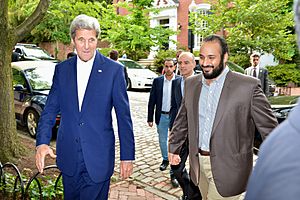
On 23 January 2015, King Abdullah died and Salman ascended the throne. Mohammed was appointed minister of defence and secretary general of the royal court. In addition, he retained his post as the minister of state.
The political unrest in Yemen (which began escalating in 2011) rapidly became a major issue for the newly appointed minister of defence, with Houthis taking control of northern Yemen in late 2014, followed by the resignation of President Abdrabbuh Mansur Hadi and his cabinet. Mohammed's first move as minister was to mobilise a pan-GCC coalition to intervene and impose a naval blockade. In March 2015, Saudi Arabia began leading a coalition of countries allied against the Houthi rebels. While there was agreement among those Saudi princes heading security services regarding the necessity of a response to the Houthis' seizure of Sana'a, which had forced the Yemeni government into exile, Mohammed launched the intervention without full coordination across security services. Saudi National Guard minister Mutaib bin Abdullah Al Saud, who was out of the country, was left out of the loop of operations. While Mohammed sold the war as a quick win on Houthi rebels in Yemen and a way to put President Hadi back in power, however, it became a long war of attrition.
In April 2015, King Salman appointed his nephew Muhammad bin Nayef as crown prince and his son Mohammed as deputy crown prince. In late 2015, at a meeting between his father and Barack Obama, Mohammed bin Salman broke protocol to deliver a monologue criticising US foreign policy]]. When he announced an anti-terrorist military alliance of Islamic countries in December 2015, some of the countries involved said they had not been consulted.
Regarding his role in the military intervention, Mohammed gave his first on-the-record interview on 4 January 2016 to The Economist, which had called him the "architect of the war in Yemen". Denying the title, he explained the mechanism of the decision-making institutions actually holding stakes in the intervention, including the council of security and political affairs and the ministry of foreign affairs from the Saudi side. He added that the Houthis usurped power in Sana'a before he was minister of defence.
In response to the threat from ISIL, Mohammed established the Islamic Military Counter Terrorism Coalition (IMCTC), a Saudi-led Islamic alliance against terrorism, in December 2015. The IMCTC's first meeting took place in Riyadh in November 2017 and involved defence ministers and officials from 41 countries.
Crown prince
Mohammed was appointed crown prince on 21 June 2017, following the King's decision to depose Muhammad bin Nayef and make his own son the heir to the throne. The change of succession had been predicted in December 2015 by an unusually blunt and public memo published by the German Federal Intelligence Service, which was subsequently rebuked by the German government.
On the day Mohammed bin Salman became crown prince, Donald Trump called him to "congratulate him on his recent elevation". Trump and Mohammed pledged "close cooperation" on security and economic issues, according to the White House, and the two leaders also discussed the need to cut off support for terrorism, the recent diplomatic dispute with Qatar, and the push to secure peace between Israel and the Palestinians.
Mohammed told The Washington Post in April 2017 that without America's cultural influence on Saudi Arabia, "we would have ended up like North Korea."
2017 purge
In May 2017, Mohammed publicly warned "I confirm to you, no one will survive in a corruption case—whoever he is, even if he's a prince or a minister". In November 2017, he ordered some 200 wealthy businessmen and princes to be placed under house arrest in The Ritz-Carlton, Riyadh. On 4 November 2017, the Saudi press announced the arrest of the Saudi prince and billionaire Al-Waleed bin Talal, a frequent English-language news commentator and a major shareholder in Citi, News Corp and Twitter, as well as over 40 princes and government ministers at the behest of the Crown Prince on corruption and money laundering charges.
Others arrested or fired in the purge included Prince Mutaib bin Abdullah, head of the Saudi Arabian National Guard; Minister of Economy and Planning Adel Fakeih; and the commander of the Royal Saudi Navy, Admiral Abdullah bin Sultan bin Mohammed Al-Sultan.
Those arrested in the Ritz Carlton were the subject of what became called "the night of beating". Detainees were denied sleep, had their heads covered, and were beaten. Seventeen had to be hospitalised. After many days, the remaining detainees were moved to Al-Ha'ir Prison, while some released are banned from travelling abroad.
Trump expressed support for the move, tweeting "I have great confidence in King Salman and the Crown Prince of Saudi Arabia, they know exactly what they are doing....Some of those they are harshly treating have been 'milking' their country for years!" French president Emmanuel Macron, who visited Riyadh days after the purge, when asked about the purge stated "this is not the role of a president, and similarly I would not expect a leader of a foreign country to come and infringe on domestic matters."
On 30 January 2019, the Saudi government announced the conclusion of the Anti-Corruption Committee's work. According to the Corruption Perceptions Index, Saudi Arabia is slowly improving its public sector, while figures of 2016 indicated a score of 46, whereby 0 implies a highly corrupt score and 100 a clear one, the index gives Saudi Arabia a score of 49 in 2017 and 2018, and 53 in 2019 the highest score achieved by Saudi Arabia until now.
Prime minister
On 27 September 2022, Mohammed was appointed as prime minister of Saudi Arabia by King Salman. Traditionally, the king has held the title of prime minister.
Administration
Ideology
Mohammed's ideology has been described as nationalist and populist, with a conservative attitude towards politics, and a liberal stance on economic and social issues. It has been heavily influenced by the views of his former adviser Saud al-Qahtani and the ruler of Abu Dhabi, Mohammed bin Zayed. His style of ruling has been described as extremely brutal by journalist Rula Jebreal and authoritarian by Jamal Khashoggi and Theodor Winkler. Mohammed bin Salman has also been championing an Arab nationalist ideology domestically and through foreign policy; with a focus on opposing Islamist movements.
Authoritarianism
Mohammed heads a repressive authoritarian government in Saudi Arabia. Human rights activists and women's rights activists in Saudi Arabia routinely face abuse by the regime. The government has targeted Saudi dissidents who are located abroad, most famously Jamal Khashoggi, a columnist of The Washington Post, who was murdered by the regime. Mohammed has justified the mass arrests of human rights activists as being as necessary for enacting reforms in Saudi Arabia and for establishing a state based on Arab nationalism.
Mohammed has increasingly consolidated power in Saudi Arabia during his tenure as leader. He significantly restricted the powers of the Saudi religious police. On 29 January 2015, Mohammed was named the chair of the newly established Council for Economic and Development Affairs, replacing the disbanded Supreme Economic Commission. In April 2015, Mohammed was given control over Saudi Aramco by royal decree following his appointment as deputy crown prince.
Domestic policies
Religious policy
According to David Ottaway of the Wilson Center, "[o]f all [Mohammed's] domestic reforms," the most "consequential" has been his work limiting the influence of Saudi Wahhabi clergy, "who still command millions of followers in the country and beyond". Mohammed's inviting of "a constant stream of Western male and female singers, bands, dancers and even American female wrestlers" to perform in Saudi Arabia is in complete conflict with religious conservatives who have spoken "against the opening up of the kingdom to secular Western culture". Under Mohammed, the Saudi government has promoted a new Saudi identity and nationalist history that downplays religious heritage and restricts Islamic influence in the cultural sphere. Journalist Graeme Wood writes, "it is hard to exaggerate how drastically this sidelining of Islamic law will change Saudi Arabia." Gabriella Perez argues that the new social changes implemented by MBS are oriented towards secularist repression, with the potential to adversely impact freedom of religion in the country.
In a 2018 interview with The Atlantic editor-in-chief Jeffrey Goldberg, Mohammed stated regarding his basic approach to religion in Saudi Arabian society:
"We believe we have, in Saudi Arabia, Sunni and Shiite. We believe we have within Sunni Islam four schools of thought, and we have the ulema [the religious authorities] and the Board of Fatwas [which issues religious rulings].. our laws are coming from Islam and the Qur'an, but we have the four schools—Hanbali, Hanafi, Shafi’i, Maliki—and they argue about interpretation. And you will find a Shiite in the cabinet, you will find Shiites in government, the most important university in Saudi Arabia is headed by a Shiite. So we believe that we are a mix of Muslim schools and sects."
Restrictions on religious police
In 2016, Mohammed took steps to drastically curtail the powers of the "Committee for the Promotion of Virtue and the Prevention of Vice" (CPVPV), or Islamic religious police. The "feared" CPVPV, which had thousands of officers on the streets and powers to arrest, detain, and interrogate those suspected of violating of sharia, was banned "from pursuing, questioning, asking for identification, arresting and detaining anyone suspected of a crime". Cinema industry was reinstated, social liberties were expanded, gender mixing and dating have been normalised by the state in public sphere. Schmidt-Feuerheerd argues that the new state policies are also accompanied by an increasing clampdown on political and religious activities independent of the government.
Changes to legal system
Mohammed states that "in Islamic law, the head of the Islamic establishment is wali al-amr (Arabic: وَلِيّ الأمر ), the ruler. While Saudi rulers "have historically stayed away from religion", and "outsourced" issues of theology and religious law to "the big beards", traditionally conservative and orthodox religious scholars, Mohammed has "a law degree from King Saud University" and "flaunts his knowledge and dominance over the clerics", according to Graeme Wood. He is "probably the only leader in the Arab world who knows anything about Islamic epistemology and jurisprudence", according to American historian Professor Bernard Haykel. In an interview televised in Saudi Arabia on 25 April 2021, Mohammed criticised the devotion of Saudi religious leaders to Wahhabi doctrines "in language never before used by a Saudi monarch", saying "there are no fixed schools of thought and there is no infallible person", and that fatwas "should be based on the time, place and mindset in which they are issued", rather than regarded as immutable.
In interviews with Wood, Mohammed
explained that Islamic law is based on two textual sources: the Quran and the Sunnah, or the example of the Prophet Muhammad, gathered in many tens of thousands of fragments from the Prophet's life and sayings. Certain rules—not many—come from the unambiguous legislative content of the Quran, he said, and he cannot do anything about them even if he wants to. But those sayings of the Prophet (called Hadith), he explained, do not all have equal value as sources of law, and he said he is bound by only a very small number whose reliability, 1,400 years later, is unimpeachable. Every other source of Islamic law, he said, is open to interpretation—and he is therefore entitled to interpret them as he sees fit. The effect of this maneuver is to chuck about 95 percent of Islamic law into the sandpit of Saudi history and leave MBS free to do whatever he wants. "He's short-circuiting the tradition," Haykel said. ".. That leaves him to determine what is in the interest of the Muslim community. If that means opening movie theaters, allowing tourists, or women on the beaches on the Red Sea, then so be it.”
As of early 2021, Mohammed has "ordered a codification of Saudi laws that would end the power of individual Wahhabi judges to implement" their own interpretation of Sharia. According to Wood, many conservative clerics strongly appear to have succumbed to "good old-fashioned intimidation" by the government to reverse their religious positions and supporting the government line on issues such as "the opening of cinemas and mass layoffs of Wahhabi imams".
Abaya ban
In December 2022, Saudi Arabia's Education and Training Evaluation Commission (ETEC) declared a governmental ban on Muslim female students from wearing the traditional abaya clothing to examination centres; insisting that students should wear only school uniforms. A later clarification from ETEC reported by The Milli Chronicle stated that the ban on abayas was restricted only for all-female examination centres run by the ETEC.
Human rights
Early in his leadership tenure, Mohammed sought to cultivate an image of Saudi Arabia as implementing various reforms. Human rights groups say that repression has worsened under his tenure. According to human rights groups, arrests of human rights activists have risen under Mohammed. He has reportedly created the Tiger Squad, a team of assassins that act as a death squad, to target Saudi critics inside and outside Saudi Arabia. Among those detained in a wave of arrests in September 2017 were Abdulaziz al-Shubaily, a founding member of the Saudi Civil and Political Rights Association (ACPRA); Mustafa al-Hassan, an academic and novelist; and Essam al-Zamel, an entrepreneur. Ahead of the lifting of the ban on women driving in June 2018, 17 women's rights activists were arrested, including the women to drive and anti-male guardianship campaigner Loujain al-Hathloul. Eight of the 17 were subsequently released. Hatoon al-Fassi, an associate professor of women's history at King Saud University, was arrested shortly afterwards.
In response to foreign criticism and women's rights activism, Mohammed has implemented modest reforms to improve women's rights in Saudi Arabia. In September 2017, he implemented the women to drive movement's multi-decade demand to lift the ban on female drivers. He legislated against some elements of Saudi Arabia's Wali system, also a topic of a decades-long campaign by women's rights activists. In response to the Saudi anti male-guardianship campaign, the Saudi government enacted a law that allows women above 21 years old to obtain passports and travel abroad without needing the permission of their male guardians. In February 2018, it became legally possible for Saudi women to open their own business without a male's permission. According to the Saudi Information Ministry, as of March 2018[update], mothers in Saudi Arabia became authorised to retain immediate custody of their children after divorce without having to file any lawsuits.
In February 2017, Saudi Arabia appointed its first woman to head the Saudi Stock Exchange.
Environmentalism
Under Mohammed's leadership, Saudi Arabia has lobbied to weaken global carbon emissions-reduction agreements. In June 2023, Mohammed visited a summit in France "aimed at bringing together private and public funding" to fight climate change and protect biodiversity. He met French president Emmanuel Macron in Paris.
Personal life
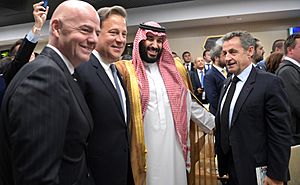
On 6 April 2008 Mohammed married his first cousin Sara bint Mashour, a daughter of his paternal uncle Mashour bin Abdulaziz. The couple have five children; the first four were named after their grandparents, and the fifth one is named after his great-grandfather King Abdulaziz, the founder of Saudi Arabia. In 2022, The Economist reported that on at least one occasion, Mohammed beat Sara so severely that she required medical treatment.
In 2015, Mohammed purchased the Italian-built and Bermuda-registered yacht Serene from Russian vodka tycoon Yuri Shefler for €500 million. In 2015, he purchased the Château Louis XIV in France for over $300 million. In 2018, he was ranked by Forbes as the eighth most powerful person in the world, with a personal wealth of at least $25 billion.
In December 2017, a number of sources reported that Mohammed, using his close associate Prince Badr bin Abdullah bin Mohammed Al Farhan as an intermediary, had bought Salvator Mundi by Leonardo da Vinci; the sale in November at $450.3 million set a new record price for a work of art. This report has been denied by the auctioneer Christie's, the Saudi Arabian embassy, and the UAE government, which has announced that it is the actual owner of the painting. The exact current location of the painting is unknown, as it has not been seen publicly since the auction. However, it has been suggested that Mohammed's yacht Serene houses Salvator Mundi.
Mohammed has travelled extensively around the world, meeting with politicians, business leaders and celebrities. In June 2016, he travelled to Silicon Valley and met key people in the US high tech industry, including Facebook founder Mark Zuckerberg. In early 2018, he visited the United States, where he met with many politicians, business people and Hollywood stars, including President Trump, Bill and Hillary Clinton, Henry Kissinger, Michael Bloomberg, George W. Bush, George H. W. Bush, Bill Gates, Jeff Bezos, Oprah Winfrey, Rupert Murdoch, Richard Branson, Eric Garcetti, Michael Douglas, Morgan Freeman, and Dwayne Johnson. Trump praised his relationship with Mohammed. The prince also visited the United Kingdom, where he met with Theresa May, Queen Elizabeth II and Prince William, Duke of Cambridge.
In 2018, Mohammed's personal net worth was estimated at US$3.0 billion.
On 25 December 2020, as part of the Saudi Arabian Ministry of Health's national COVID-19 vaccination plan, the Crown Prince was shown receiving the vaccine in a video released by the Saudi Press Agency.
In December 2020, Mohammed invested money into Take-Two Interactive, Electronic Arts, and Activision Blizzard through Saudi Arabia's sovereign wealth fund. The investments amounted to 14.9 million shares in Activision Blizzard, 7.4 million shares in Electronic Arts, and 3.9 million shares in Take-Two Interactive. Mohammed has stated that he grew up playing video games.
On 19 November 2022, Mohammed was awarded an honorary doctorate from Kasetsart University in the field of land knowledge for sustainable development.
Honours
| Styles of Prince Mohammed bin Salman Al Saud |
|
|---|---|
 |
|
| Reference style | His Royal Highness |
| Spoken style | Your Royal Highness |
 Bahrain:
Bahrain:
 Tunisia:
Tunisia:
 Pakistan:
Pakistan:
 Nishan-e-Pakistan (18 February 2019)
Nishan-e-Pakistan (18 February 2019)
 Oman:
Oman:
 UAE:
UAE:
 Jordan:
Jordan:
See also
 In Spanish: Mohamed bin Salmán para niños
In Spanish: Mohamed bin Salmán para niños
- List of current heirs apparent
Images for kids
-
With Brazilian president Jair Bolsonaro (left, seated) at the 2019 G20 Osaka summit
-
Palestinians protest in the Gaza Strip, 9 December 2017
-
With US defense secretary James Mattis (right), 22 March 2018
-
With US secretary of state Antony Blinken in Jeddah, 7 June 2023
-
With US secretary of state Mike Pompeo (right), 16 October 2018


